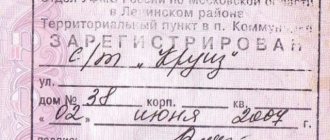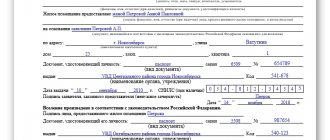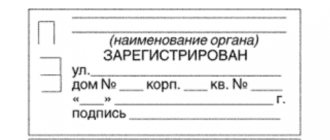Stay and residence - these terms are used in Russian regulations to denote a person’s relationship to a specific place. There are even more adjectives - actual, temporary, permanent. Such an abundance of definitions leads to misunderstanding by ordinary citizens and, as a result, to violation of the law. After all, there is liability for the lack of registration. In this material we will look at how the place of registration differs from the place of actual residence and when it is legal to indicate certain data.
Place of registration: understanding the concept
In simple terms, the place of registration is the address that is written in a person’s documents:
- in the passport (in case of permanent registration);
- in a specially issued certificate (in case of temporary registration or issued to children under 14 years of age who do not yet have a passport).
Quite often situations arise when a citizen does not live at the address recorded in the documents. What should I do? When do you need to notify the migration authorities and is it necessary to do this at all? In this case, is registration a place of residence or a place of stay? Where and when to contact when changing address?
Let us present the basic meanings of each of the terms to differentiate them more clearly.
Place of residence – permanent
The length of stay in an apartment (house) is the main component of the answer to the question of what is a citizen’s place of residence.
The grounds for living in residential premises are the rights of the owner, the rental agreement and other components provided by law.
Objects of continuous residence are:
- house or apartment;
- your own housing (as an owner), service or rented;
- boarding houses.
You must register at your place of regular residence within 7 days after moving in. Traditionally, it is believed that the place of residence is the address recorded in the stamp in the passport.
To do this, you need to provide the following to the territorial offices of the Main Directorate for Migration of the Ministry of Internal Affairs:
- passport;
- sample application;
- grounds for registration of moving into the premises (ownership rights or lease agreement);
- if the person is not the owner of the apartment, the consent of the owner of the living space is attached.
Such rules are relevant not only for Russian citizens, but also for foreign ones. In this case, the place of residence is considered to be the place where the foreign citizen permanently resides for a long time legally.

Place of residence – temporary
The premises in which a citizen lives temporarily is called a place of stay. These include short-term rented apartments, boarding houses, hotels, etc.
Registration at the place of residence of a Russian or foreign citizen requires strict adherence to the following deadlines:
- Russians who live at an address that does not match the one indicated in their passport (permanent registration) must notify government agencies 90 days after moving in. Previously, a certificate of temporary registration, which means at the place of stay, could not be issued;
- The law requires foreigners to register for migration (perform temporary registration) within 7 days from the date of crossing the border. Separate conditions exist for citizens of Tajikistan (15 days) and citizens of EAEU member countries (30 days).
By the way, in case of check-in into “state-owned” premises (hotels, hospitals, etc.), the administration of these institutions deals with registration issues. You should also know that the address of the place of residence is, in fact, the address of the residential premises in which a citizen lives temporarily - for six months or a year. A person can exercise civil rights indicating this location during the validity period of the documents. This is especially true for migrants.
It often happens that a citizen, being registered in one place, lives primarily in another, so the question: is temporary registration a place of residence is quite natural in this situation. More on this in the following sections.
The main differences between the terms “place of residence” and “place of stay”
Taking into account the above, we can draw conclusions about the main differences characterizing the concepts of “place of residence” and “place of registration”:
- duration of stay;
- grounds for moving in;
- type of accommodation facility;
- completed documents to confirm the fact of residence;
- responsibility for registration;
- the scope of civil rights to which a citizen has access.
We see that how long a person stays in the premises and what rights he has to this living space determine the key difference between the place of stay and the place of residence.
Let's also say a few words about documents that confirm the fact and method of registration of a person at a certain location.
The address of the “place of residence” is most often formalized as “permanent registration” and looks like:
- as a stamp in a passport (for adults and children over 14 years old);
- as evidence - Form No. 8 of the Administrative Regulations of the Ministry of Internal Affairs of the Russian Federation for the provision of state services for registration (Order of the Ministry of Internal Affairs of Russia dated December 31, 2021 No. 984) - for children under 14 years of age who do not yet have a passport;
- as a mark - Appendix No. 4 of the Administrative Regulations of the Ministry of Internal Affairs of the Russian Federation (Order of the Ministry of Internal Affairs of Russia dated November 23, 2021 No. 881) - for foreign citizens, etc.
When listing how the place of residence differs from the place of stay, it is worth mentioning documents to confirm temporary location as another differentiating aspect. After all, the fact of registration at a temporary address is confirmed solely by a certificate. Its variety is also different - form No. 3 is used. Documents according to form No. 3 and No. 8 are issued in person upon registration of the fact of “moving into” the premises and are issued individually to the citizen. The fact of registration is also confirmed by a registration certificate in Form No. 9; it is ordered additionally and contains information not about one citizen, but about all those registered in a given apartment (house).
Speaking about a person’s civil rights and his access to public services (education, medicine, etc.) at his place of residence or place of stay, it will be useful to know the following:
- all rights are exercised at the place of primary residence;
- in case of temporary registration, access to public services is limited to the period for which the certificate was issued.
Difference of concepts
The need to record location is due to the observance of law and order and the performance of duties on the part of both citizens and the state. The Civil Code of the Russian Federation obliges people to register in their own interests. After all, if the actual population in a city does not coincide with the official number of people based on the census, this can lead to problems in the administrative, housing, electoral and other aspects of the law of such a region.
For example, unregistered citizens living in the city are legally unable to vote in elections. In medical institutions, the number of beds and medical personnel will also not correspond to the actual workload. This is why every citizen must indicate their location to the passport and visa service when moving to another region or city.
Unfortunately, not all residents show responsibility and come to the Department of Migration Affairs of the Ministry of Internal Affairs (the department for migration issues, which replaced the FMS) to register. And this is largely due to confusion in concepts.
Registration address (official registration) - permanent place of residence, which is placed on the fifth page of the passport in the form of a stamp. The Civil Code distinguishes three main terms relating to the dislocation of people and assigning it to certain territorial bodies:
- registration address;
- place of residence;
- place of residence.
Often the address in passports does not coincide with the registration address where citizens live. In this case, the wording “place of residence” or “place of stay” is suitable. How to understand these concepts in practice? Let's give a few simple examples.
This is interesting: Law on registration of citizens at place of residence and place of stay
What is a place of registration
Legal registration of citizens is registration, which is indicated in the passport as permanent place of residence. As a rule, it is obtained as a result of the privatization of municipal apartments, when purchasing housing on the primary or secondary market. Most citizens receive initial registration in their parents' home. If a person does not move, then the address indicated in the passport coincides with the place of residence. In this case, the law requiring citizens to live at the place of registration (RF Government Decree No. 713) is observed.
Nuances of the concept of “place of residence”
When a person leaves the apartment or house in which he was originally registered, the new point of location is considered to be his place of residence. If a citizen settles at such an address, then he is obliged to record this fact by reporting this residential address to the territorial passport and visa service. For example, a girl got married or a young man got married and moved to live with his husband in another city. At the same time, he (she) cannot do without registering at a new location.
If a husband or wife registers their spouse in their apartment, then we will again be talking about official registration. To do this, it is necessary to deregister at the territorial office of the UMV at the place of residence by putting the appropriate stamp in the passport.
What is a place of residence
If a citizen moves to a different address due to the performance of official, military and other duties for a short period of time, then his deployment qualifies as a place of stay. This means a short-term change of place of residence, after which the person is expected to return to the address indicated during state registration as the main place of residence. For example, when sending employees to another city, the employing company temporarily rents apartments for their accommodation for 2 months. In this case, you need to register temporarily at the passport office.
This is interesting: Where to get a certificate of family composition and what is needed for this
The concept of actual place of residence
For citizens who, for various reasons, are forced to move around cities and towns, it is important to know exactly what their actual place of residence is and how it relates to registration.
The answer is simple: the place of actual residence is the address where the citizen is mainly located, where he spends most of his time, and which area he uses the infrastructure of.

Determination of place of residence in law
Article 20 of the Civil Code of the Russian Federation recognizes such a place where a citizen permanently or primarily resides. The Law on the Right of Citizens to Freedom of Movement provides a more detailed definition:
- place of residence is a residential house, apartment, room or other residential premises in which a citizen permanently or primarily resides as the owner, under a rental agreement, incl. social hiring, on other grounds provided for by the legislation of the Russian Federation. And in which such a citizen is registered at his place of residence.
Thus, the place of residence can only be a residential premises. Non-residential premises, hotel, sanatorium, etc. they are not.
The answer to the question “what is residential premises” is contained in the Housing Code of the Russian Federation, namely Art. 15, 16 Housing Complex of the Russian Federation. This is an isolated premises, which is real estate and is suitable for permanent residence of citizens (meets established sanitary requirements, rules, technical rules and regulations and other requirements of the legislation of the Russian Federation. This is a residential building, part of a residential building, apartment, part of an apartment, room.
Recently, such a type of real estate as apartments has become widespread in Russia. Please note: The law does not recognize them as housing. This means that this is not the citizen’s place of residence. Not to mention the fact that the tax on such real estate is different, as is the way of managing an apartment building. And the apartments, even if they are the only housing, may be subject to foreclosure on the debtor’s property as part of enforcement proceedings.
According to the Civil Code of the Russian Federation, if a person informed his creditors of a place of residence other than the registered one (actual place of residence), he himself bears the risk of adverse consequences. This includes the risk of not receiving claims and other information.
Actual residence and registration: common and distinctive features
It is also interesting to understand how the place of registration and place of residence relate.
The address where a person actually lives may coincide with the place of both permanent and temporary registration. The latter is possible, for example, in cases where citizens are “registered” in one city and work or study in another for a long period of time. It is the second address that is considered the place of actual residence.
Another key feature that shows the difference between the place of stay and the place of actual residence is the type of residential property. They “stay” temporarily in hotels, boarding houses, health centers and other similar institutions. A hotel cannot become a place of long-term stay, and you cannot obtain permanent registration here. But they “live” precisely in residential premises (that’s why they are called that). Here it is possible to stay for a long time and register as a permanent resident (if there are grounds).
Permanent place of residence: all parameters match
The concept of “address of permanent residence” is a “complex” of all key characteristics:
- long stay in a residential area;
- completed registration;
- access to public services in the nearest educational, medical, migration, social and other authorities;
- ownership of an apartment (house) or long-term lease, etc.
It is access to all government benefits that encourages foreign migrants to apply for permanent residence or residence as a citizen of the country.
When to indicate what data in documents
Quite often, when filling out various documentation, confusion occurs when the address of residence and the address of actual residence do not match.
If a person does not live at the place of permanent registration for a long time, then he needs to obtain a temporary one, which, among other things, resolves the issue of what data to indicate in applications and questionnaires for the use of services at the place of actual residence. In such a situation, for example, when contacting a clinic, the address of temporary registration, that is, the place of actual residence, is indicated.
The difference between the place of residence and the place of registration is significant in cases where temporary registration has not been issued. For example, when a person lives at a given address for less than 3 months. It’s good that many forms today already have separate places for indicating permanent registration and actual residence address. If such columns are missing, it is advisable to still address the issue of temporary registration and indicate this address.
Place of residence of the child
The law considers children under 14 years of age incompetent. That is, they exercise rights and obligations through legal representatives. These are parents, guardians or trustees.
The place of residence of a minor under 14 years of age, as well as a citizen declared incompetent, is the place of residence of his legal representatives. The consent of the owner or tenant is not required to move in a minor (under 14 years of age). He moves in automatically with one of the parents. Or with both (if their place of residence coincides). The place of residence of a person over 14 years of age may differ from the place of residence of parents or legal representatives.
To determine the place of residence of a child with one of the parents, if there is a dispute, you will have to go to court. To do this, a statement of claim is drawn up to determine the child’s place of residence.
Freedom of movement of citizens is associated with reaching the age of 14 years. And up to the age of 14, the state determines the place of residence of children exclusively according to their legal representatives.
According to paragraph 2 of Art. 36 of the Civil Code of the Russian Federation, guardians and trustees of minors are required to live together with their wards. Separation is possible if the ward has reached 16 years of age. Based on this, the place of residence of a minor under 16 years of age, to whom the guardianship authority has appointed a guardian (orphans), determines the place of his guardian. And if they live separately, it is determined on a general basis. The law follows the path that the municipality where the orphan lives must provide housing for orphans.









